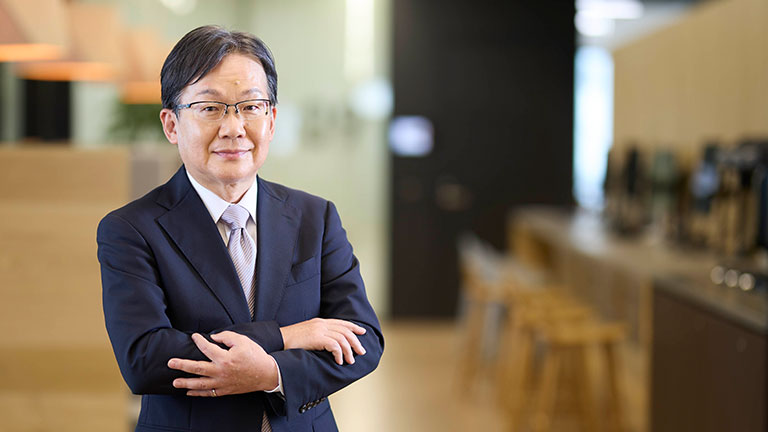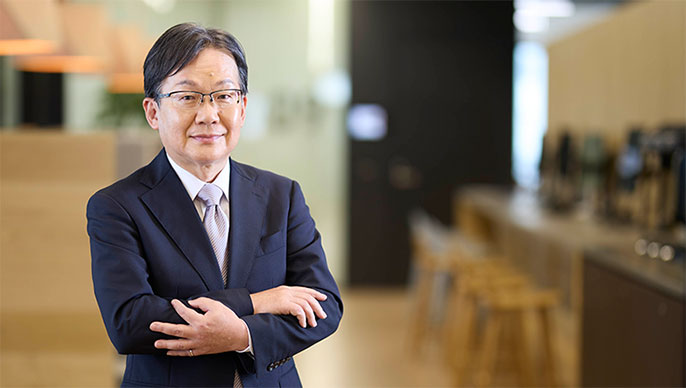CFO Message


We will communicate the growth story of Mitsui by further advancing our portfolio management,
and showing the progress we make in portfolio quality improvement and execution of growth investments.
Representative Director,
Senior Executive Managing Officer
Chief Financial Officer
Tetsuya Shigeta
What are your thoughts as you reflect on Medium-term Management Plan 2023?
With the COVID-19 pandemic, supply chain disruption caused by the situation in Russia and Ukraine, rampant inflation, and other factors, the three-year period covered by Medium-term Management Plan 2023 (MTMP2023) tested our ability to respond to changes in the external environment. Demand from customers and partners for solutions to various challenges increased, and there were many opportunities for us to demonstrate our capabilities and expand our businesses. As a result, we were able to develop a robust business portfolio and achieve solid results. Although there was a delay to certain growth investments due to the pandemic, we enhanced our pipeline of quality investment projects,
and have been making steady progress toward investment execution in the fiscal year ending March 2024 and beyond.
Inspired with confidence gained from the successes of MTMP2023, Medium-term Management Plan 2026 (MTMP2026) is off to a good start.
While building upon and taking strategies and policies from MTMP2023 to the next level, we aim to further enhance our management foundation and earnings base.
What is your approach to cash flow allocation under MTMP2026?
We will further enhance our cash flow management. Under MTMP2023, investors appreciated the clarity of our approach to cash flow allocation, so we will continue along this path. As of MTMP2026’s announcement in May 2023, we guided to 1.17 trillion yen being allocated to growth investments (for which decisions have already been made or policies confirmed) to be made by the end of the term. Moving forward, while carefully selecting investment projects from our pipeline of potential candidates, we will distribute additional capital through the Management Allocation framework.
In terms of shareholder returns, based on stable Core Operating Cash Flow we increased our target for shareholder returns as a percentage of Core Operating Cash Flow (on a cumulative basis for the three years of the plan) from 34% under MTMP2023 to around 37%. Moreover, to date we have continued to increase dividends and, given that we are forecasting further increases in base profit during the period of MTMP2026 we have introduced a progressive dividend with a minimum full-year dividend of 150 yen per share.
How do you plan to advance portfolio management during MTMP2026?
Corporate Management Committee members, who oversee each business unit, are playing a greater role in the rigorous selection of growth investments. Dialogue between Executive Officers and Chief Operating Officers is helping to ensure that, more than ever before, discussions are made on a Company-wide perspective. In addition to business robustness and profitability, we place focus on size, strategy, scarcity, and the likelihood of immediate contribution to results. Discussions also now consider the compatibility of projects with the Key Strategic Initiatives of MTMP2026, the formation of business clusters, and our efforts to further deepening sustainability management. On the investment side of the business for example, we penetrate into a particular industry through our involvement in trading businesses, and then use the expertise and presence that we gain there to make investment decisions which will be based on our deep understanding of that particular business. This enables us to pursue returns that outweigh the risks in each industry.
In working to improve the quality of our business portfolio, we have been highlighting the importance of the “middle game.” Under the “Create, Grow, Extend” business model, middle game refers to the “Grow” phase. We aim to reinforce our businesses by having a strong middle game, by formulating a number of business scenarios that will enable us to respond to changes in the operating environment and implement strategic measures ahead of schedule, or at the optimal time.
Furthermore, under MTMP2023 we began using ROIC as an indicator that links the company wide ROE target with asset efficiency in each segment, and have thereby been enhancing the quality of our portfolio reviews. We conduct dynamic analyses of ROIC targets, taking into account the fact that risks and lifecycle stages of each business differ. Our ROE target in MTMP2026 is an average of over 12% over the three year period, a figure that exceeds the cost of equity. We aim for sustained ROE enhancement through improved earnings, an optimal capital structure, and enhanced shareholder returns.
What are your thoughts on the execution of Mitsui’s growth strategies and corporate value enhancement through value creation?
At Mitsui, we create value by using the global expertise and functions from our various segments to provide cross-industry real solutions to social issues emerging due to major changes in the external environment. As such, our business activities are a source of both social and economic value, and the associated results and expectations are directly connected to enhancement of our corporate value. One representative example is the global energy transition, which we support by balancing the stable supply of existing energy sources with the development of new energy sources for the future. Elsewhere, in responding to heightened consumer health needs by building a wellness ecosystem that combines food and nutrition, we are creating social and economic value through the provision of healthy foods for preventive care and therapeutic foods for hospitals.
More complex social issues come with more complex risks. How are you addressing such risks?
At present, the complexity of global risks is increasing in terms of geopolitics, supply chains, ESG, and cybersecurity, for example, and our risk management response must address more aspects and with a greater level of sophistication. For us to enhance our corporate value, in addition to improving profitability and growth potential in each segment, risk management is essential to our ability to support our businesses and control uncertainties into the future. At Mitsui, we conduct integrated risk management, through which we promote multilayered collaboration between the business units and Corporate Staff Divisions, and also among the various Corporate Staff Divisions. Moreover, the Portfolio Management Committee holds regular discussions and reports its findings to the Corporate Management Committee and the Board of Directors. Moving forward, we will work to further advance these mechanisms and initiatives and incorporate them into our portfolio management.
What insights have you gleaned from dialogue with shareholders and investors?
For me, dialogue with our shareholders and investors is a top priority. Since becoming CFO last year, I have shared with them the details of our management policies and discussions, focusing on clear communication and explanations using specific examples. Their opinions and suggestions provide many insights, which I have proactively relayed in-house to be reflected in management discussions and improvements. We are sometimes told that our business model is difficult to understand, but nevertheless, I feel as though the transparency of our management has been increasing through this dialogue.
Looking ahead, I will thoroughly monitor the progress of the policies and strategies in MTMP2026. By regularly disclosing the progress of new investment projects and showcasing our track record, I hope to be able to build trust in our businesses among shareholders and investors, and in turn lower our cost of capital. We have our sights on many potential impactful projects for growth investment, and as such I will continue to communicate Mitsui’s value creation story to hopefully generate high expectations for our future growth.